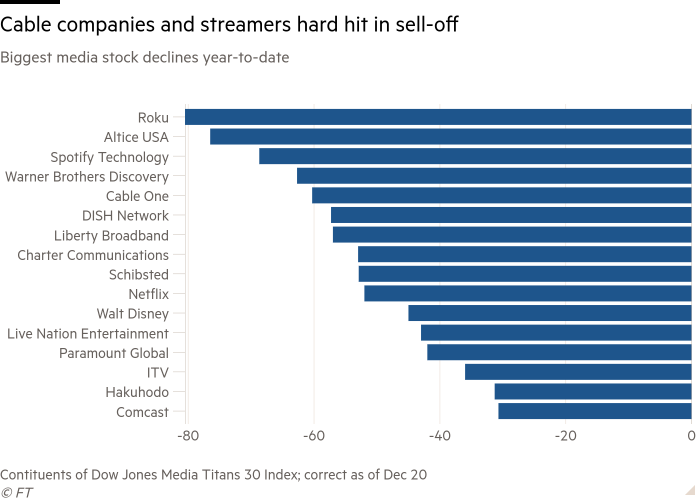
More than $500bn has been wiped off the market value of the world’s biggest media companies this year as investors soured on the streaming revolution, triggering historic share price declines for broadcasting and entertainment groups.
Intensifying competition and rising costs have combined with consumer belt tightening and an advertising slowdown to spark an industry-wide decline.
Media, which for investors spans a broad range of activities from film production to advertising to cable television, has been among the hardest-hit sectors in what is set to be the worst year for global equities since the financial crisis.
“It’s been a perfect storm of bad news,” said Michael Nathanson, media analyst at SVB MoffettNathanson. “I’ve been covering this sector a long time and I’ve never seen such a bad collection of data points before.”
Walt Disney shares, down about 45 per cent, are heading for their biggest annual fall since at least 1974. The shares have come under more pressure in recent days as takings from Disney’s eagerly anticipated Avatar sequel fell short of some estimates in its opening weekend.
Paramount Global has dropped 42 per cent this year and Netflix 52 per cent, while Warner Brothers Discovery has tumbled 63 per cent since its creation this year by the combination of Discovery and AT&T’s WarnerMedia.
The conglomerate’s executives are trying to integrate two of the largest operations in media at a time of industry turmoil, and last week warned it faced as much as $5.3bn in restructuring and other charges related to the merger.
Streaming companies tended to cope well with the onset of the pandemic as lockdown restrictions boosted audiences, pushing shares across the sector higher in the stock market boom from March 2020.
But while executives spent tens of billions of dollars on streaming content, viewing options have proliferated while living costs have soared — encouraging financially squeezed households to “churn”, or switch between subscriptions.
The Dow Jones Media Titans index, which tracks the performance of 30 of the world’s biggest media companies, has shed 40 per cent this year, with its total market value shrinking from $1.35tn to $808bn.

Rising interest rates have dented valuations, particularly of the sector’s jam-tomorrow “growth stocks”. Music provider Spotify has slumped 69 per cent and video specialist Roku 81 per cent.
Traditional broadcasters have been hit too. Some of the steepest share price declines have been for owners of US cable assets, long a cash cow. Charter Communications is down 53 per cent and Comcast 31 per cent.
So-called cord-cutting has accelerated in the US, with the number of subscriptions to traditional pay TV tracked by Macquarie falling 8.3 per cent in the third quarter compared with the same period a year earlier.
Price rises — especially for sport — had until recently mitigated the drop in customers, “but getting into a recession, you worry that the consumer will refuse to pay”, said Tim Nollen, media tech analyst at Macquarie.
Most streaming services were incurring “very heavy losses” so media companies “aren’t yet in a position where [they] can offset the linear decline”, Nollen added.
Advertisers, meanwhile, have become more reluctant to promote brands as the global economy slows, hurting media owners including the UK’s ITV, whose shares have lost 36 per cent.
The broadcaster recently said it was on track for a decline in annual ad revenues despite a boost from the football World Cup.
In response to the challenges, several of the largest companies in the sector are turning to price rises, job cuts and other initiatives such as ad-supported streaming tiers.
Morgan Stanley analysts wrote in a report this week that if such moves failed to deliver “meaningful” profits in streaming, the companies would be forced either to “give up” or consolidate.